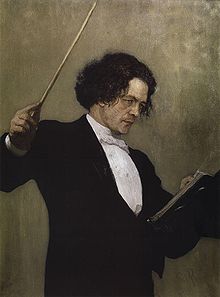- Die Maccabäer
-
Anton Rubinstein  Operas
Operas- Dmitry Donskoy (1852)
- Fomka the Fool (1853)
- Die Kinder der Heide (1861)
- Feramors (1863)
- Der Thurm zu Babel (1870)
- The Demon (1871)
- Die Maccabäer (1875)
- Néron (1879)
- The Merchant Kalashnikov (1880)
- Christus (1895)
Die Maccabäer (German, The Maccabees) (sometimes spelt 'Die Makkabäer') is an opera in three acts by Anton Rubinstein to a libretto by Salomon Hermann Mosenthal. The opera is based on a play by Otto Ludwig, which is itself based loosely on the biblical story of the Maccabees. Written in 1872-74, it was first performed on 17 April 1875 at the Hofoper, Berlin. Censorship problems prevented its performance in Russia until January 1877 (in St.Petersburg).
Contents
Background
Die Maccabäer was Rubinstein's most successful opera, holding the German and Russian stages throughout his lifetime. The Berlin reviews of its premiere compared its success to that of Meyerbeer's L'Africaine, and after its Vienna premiere in 1878, the critic Eduard Hanslick believed it showed an alternative model for operatic development to the works of Richard Wagner. Rarely performed since the 19th century, there was a production in Hebrew in Jerusalem in 1925.[1]
The rumour that the opera was to be premiered in Russia in the 1876/7 season aggravated the breach between the composer and Peter Tchaikovsky, who feared that it would displace his own opera Vakula the Smith (which however was performed there in December 1876). Tchaikovsky wrote to his brother Modest Tchaikovsky:
[..]Tell Anton Rubinstein "My brother has instructed me to tell you that you are a son of a bitch, and you can go and stuff your mother". No one has wounded my self-esteem as much as this Peterhof resident. And now he comes creeping with his mangy operas[..] If it weren't for the penal code, I would go to Peterhof and happily burn his wretched villa to the ground[...][2]
.
Roles
Role Voice type Premiere Cast, April 17, 1875
(Conductor: )Antiochus, king of Syria bass Cleopatra, his daughter soprano Gorgias a military captain baritone Lea, mother of the Maccabees contralto Juda a Maccabee baritone Eleazar a Maccabee tenor Joarim a Maccabee mezzosoprano Benjamin a Maccabee soprano Noemi wife of Juda soprano Boas Noemi's father bass Joachim, a priest bass Chorus: courtiers, Syrian and Hebrew soldiers, priests etc. Synopsis
Judaea: Modin and Jerusalem, 160 BC. The Jews resist the army of Syria under the leadership of the Maccabees, but Eleazar betrays the insurrection after falling in love with the Syrian king's daughter, Cleopatra. Juda is defeated and flees. After pleas from Lea, Antiochus agrees to spare the two younger brothers only if they renounce their religion - otherwise they will be burnt alive. Eleazar repents and joins them for their execution. At this point Juda, who has reignited the revolt, invades the palace. Antiochus is killed, but Lea also dies after witnessing her son's victory.
Sources
- Richard Taruskin.Maccabäer, Die in Oxford Music Online, accessed 17 April 2010
- Philip S.Taylor, Anton Rubinstein, A Life in Music, Indianapolis, 2007
Notes
Categories:- Operas
- 1875 operas
- German-language operas
- Operas by Anton Rubinstein
- Operas based on the Bible
- Berlin State Opera world premieres
Wikimedia Foundation. 2010.
